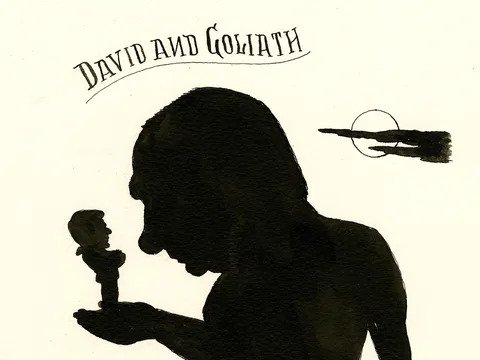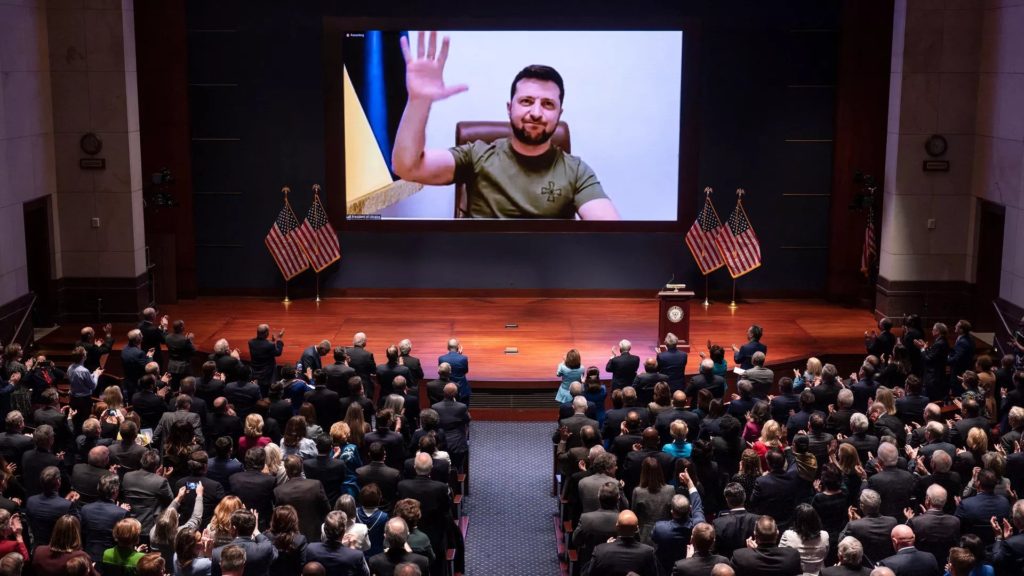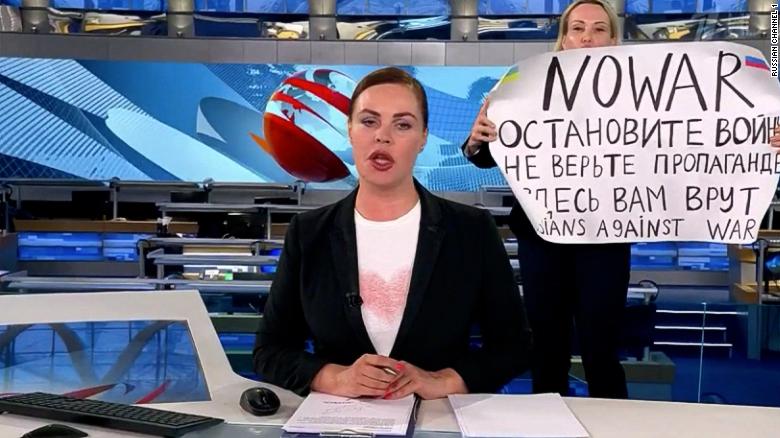At the most consequential hour in Europe since the collapse of the Soviet Union, a comedian has assumed the role of Winston Churchill.
And in Russia, state television varies little, aesthetically and narratively, from channel to channel.

16 March 2022 (Paris, France) – Americans today seem to believe that we live in especially exhausting political times. But the rhythms of our moment – pandemic, protest, pandemic, election, insurrection, pandemic, invasion of Ukraine – have nothing on the Truman era. Between April, 1945, when Franklin D. Roosevelt’s death thrust Harry S. Truman into office, and January, 1953, when Truman handed the Presidency to Dwight D. Eisenhower:
•the war in Europe ended
•Hitler killed himself
•the United States dropped two atomic bombs on Japan
•the Cold War began
•the state of Israel came into being
•the Soviet Union developed its own nuclear weapons
•China underwent a Communist revolution
•the West created NATO
•the world created the United Nations
•the Korean War began
Well, one could on and on. And I have been immersing myself in this early history because it creates the platform to help understand what led to the formulations of the redoubtable George Kennan, the Truman Doctrine and the U.S. determination to contain an aggressive and expansionist Soviet Union, lest the world end up with another totalitarian blitzkrieg across Europe. It was as powerful a grand strategic vision as any President has ever offered. It also led inexorably to calls for a bigger and better security state – all of which came to pass and which we can certainly say led to our security framework today.
Just as many of today’s most combustible conflicts can be traced back to these moments in the late 1940s, early 1950s. In Russia, Putin has cited NATO (born 1949) expansion as one justification for the war in Ukraine – that is preparing to mobilize against him. There is talk of a “new Cold War” with China and of the clarifying if dread-laden politics that it might produce – with Taiwan (also born 1949) as the up-and-coming hot spot. The dictatorship of North Korea, consolidated in part through Truman’s land war, continues to embrace nuclear-weapons development (also very Truman). In outlets such as Foreign Policy and Foreign Affairs, insiders wring their hands over the possible collapse of the “liberal international order,” by which they mean the complex of institutions NATO, the World Bank, the U.N. – erected in the great world-remaking experiments of the nineteen-forties.
How much Truman shaped these events, and how much he was buffeted by them, remains a puzzle. Many acknowledge Truman’s unschooled, salt-of-the-earth pose was not always what the moment called for. But from the bully pulpit, Truman could reach great heights of rhetoric. Which takes me to Ukraine President Volodymyr Zelensky.
I watched his speech today before the U.S. Congress. Almost everything about Zelensky speech would have been inconceivable on the day Russia invaded Ukraine. Who would have expected:
•Zelensky – unshaven, unbowed – to address Congress from Kyiv, when the city was supposed to fall in the initial days?
•Zelensky to seize the bully pulpit, calling on the U.S. to behave like a superpower?
The big picture? Zelensky is bursting through an era of peak cynicism. His speech evoked imagery of a youthful JFK, in his day the master of the new medium of TV. Zelensky is 44, using cellphone cameras and Zoom:
“Remember Pearl Harbor, the terrible morning of Dec. 7, 1941, when your sky was black from the planes attacking you”
“Remember Sept. 11, a terrible day in 2001 when evil tried to turn your cities, independent territories, into battlefields. When innocent people were attacked from the air.”
“Our country is experiencing the same every day, right now, at this moment. Every night for three weeks now Russia has turned the Ukrainian sky into a source of death for thousands of people.”
Addressing Biden directly, Zelensky said, “I wish for you to be the leader of the world. Being the leader of the world means to be the leader of peace.”
I want to share a few bits and pieces … a mashup as it were … from profiles of Zelensky by Marc Beresenson, David Remnick, Simon Schuster, and a few others who have actually met the man.

ABOVE: Zelensky virtually addresses the U.S. Congress today from Kyiv
At the most consequential hour in Europe since the collapse of the Soviet Union, as a vengeful and erratic autocrat invades Ukraine alluding darkly to the scale of his nuclear arsenal, a comedian has assumed the role of Winston Churchill. Volodymyr Zelensky, the President of Ukraine, has relied largely on his voice to inspire his country’s resilience. The greater part of a dispirited and fractured world has also responded to his call.
Vladimir Putin’s attempt to conquer Ukraine, to depose its democratically elected government and absorb the state into his imperial, mystical conception of a Russky Mir, a Russian World, is in its early stages. The assault has already resulted in thousands of deaths and a colossal refugee crisis. Yet the first days of the onslaught exposed weaknesses in the Russian military. Some accounts may prove inaccurate, but it is clear that Ukrainian soldiers and armed civilians have shot down Russian helicopters, destroyed Russian tanks, and generally slowed Putin’s effort to overwhelm the main cities in a few days. I expect to have a very detailed post by the weekend that explains the military situation.
Zelensky has galvanized his people through the clarity of his language. Churchill, in his essay “The Scaffolding of Rhetoric,” wrote:
“Of all the talents bestowed upon men, none is so precious as the gift of oratory. He who enjoys it wields a power more durable than that of a great king.”
Churchill employed the wireless, using blank-verse cadences to rally the will of his fellow-Britons and his foreign allies. Zelensky employs a smartphone and the simplest rhetoric to assert his presence on the front line. “Ya tut,” he told his fellow-Ukrainians as he stood on the street in Kyiv. I am here. From his bunker in the capital, he described a Russian missile strike and civilian casualties to members of the European Parliament with such ringing force that even the English-language interpreter could not contain his emotion.
Zelensky is an unlikely tribune. He grew up in Kryvyi Rih, a rough steel city in the southeast where thousands of Ukrainians, particularly Jews, were killed during the Nazi occupation. A mediocre student, he led a comedy troupe called Kvartal 95, and, in 2015, helped develop a sitcom called “Servant of the People.” And here is where the postmodernism kicks in: Zelensky played the role of Vasyl Holoborodko, a high-school teacher whose life changes when he goes on a tirade about corrupt politicians. A student films him and the video goes viral. His plaintive honesty strikes a chord in the Ukrainian people and . . . he is elected President.
“Servant of the People” was an unabashedly broad comedy, more Benny Hill than Noël Coward, and it was a hit. After a few seasons, it occurred to Zelensky that fiction might be realized as fact, that the character he was playing on television just might be what his country required: “I started out making fun of politicians, parodying them, and, in so doing, showing what kind of Ukraine I would like to see”.
In 2019, Zelensky got a great deal more attention than he ever wanted when Donald Trump, with all the finesse of a Mafia don, called to ask for a “favor”: Dig up dirt on Hunter Biden’s business dealings in the Ukrainian energy business or the U.S. would hold back hundreds of millions of dollars in military assistance. It was hard not to recall that thuggish request, a pivotal piece of evidence in Trump’s first impeachment hearings, when the former President declared that Putin’s invasion of Ukraine was “genius.”
Prior to the war, Zelensky’s popularity had declined. Oligarchs continued to exert influence on Ukraine, not least in media. Just before the invasion, he seemed at odds with President Biden, who insisted on making public the intelligence estimates about the imminence of an attack. Zelensky preferred to minimize the prospect of war. But, when the tanks rolled, Zelensky began delivering his message to his people: he would never abandon Ukraine. “He has a performer’s sixth sense of what people want—he feels their approval or disapproval,” Igor Novikov, a former adviser, said from his home in Kyiv. “In a time of crisis, he is a lens that channels the energies of the people into a single beam of light.”
There should be no illusions. Even the most penetrating rhetoric is not an anti-missile defense system. Kharkiv, Mariupol, and other cities are under bombardment. In fact, as I write this, Mariupol appears to be lost. Russian troops have attacked two nuclear power plants. What mercy is Putin likely to extend to Kyiv? Precedent is no comfort. Twenty-two years ago, he annihilated Grozny; thousands of civilians were killed. And he has never seemed as inflamed as he does now.
In contrast to Zelensky, Putin is increasingly disconnected and delusional. His high approval ratings are inflated by incessant propaganda, coercion, and the projection of national stability through bare-chested strength (see my second story below). Having taken note of the world’s tepid reaction to his military adventures in Georgia, in 2008, and in Crimea and the Donbas region, in 2014, Putin carried out this operation with seemingly serene confidence. He clearly believed that he could rely on the modernization of his armed forces and on distraction, weakness, and division in his enemies. He was mistaken.
The complex of economic sanctions thrown at Russia are hardly symbolic. The ruble has dropped sharply. To forestall a colossal sell-off, the Russian stock market was closed all of last week. Swiss banks froze many Russian accounts. Germany abandoned its cautious postwar posture, increasing its defense spending and moving to reduce its dependence on Russian energy. The International Olympic Committee, the various soccer bureaucracies, and countless corporations – entities rarely known for their moral bravery – have coöperated in sanctioning Russia.
Thousands of Russians, particularly among the urban élite, anticipate the end of a tolerable existence and are leaving for Georgia, Armenia, Turkey, and beyond. Those who remain in Russia – the vast majority – are likely to find themselves living in an isolated and profoundly more authoritarian country, perhaps under martial law. “The state is falling apart right before your eyes,” Misha Fishman, one of the lead broadcasters for TV Rain, Russia’s last independent television station, said.
The only person capable of putting an end to the invasion is the man who instigated it. Will he be overthrown? Nah. He will do everything he can to suppress dissent on the streets and among his cronies and satraps. Zelensky knows this only too well. His is a voice not only of inspiration but of stark realism. “It’s not a movie,” he said. Spoken like a man who knows that he may not live to celebrate the liberation of the country he has sworn to defend.
“The Twilight Zone” of Russian state TV

We all saw the dramatic clip of Marina Ovsyannikova, a Russian state television journalist, protest the invasion of Ukraine during a live news broadcast on Russia’s main news program for which she was found guilty yesterday of organizing an “unauthorized public event”.

Masha Gessen, the Russian-American journalist, author, translator and activist who has been a long time outspoken critic of Putin and Trump (she is now safely in New York with her family) has been my long-time “must read” on Twitter, as well as her book “The Future Is History” which critics universally acclaim is a beautifully-written, perfectly structured journey through Russia’s failure to build democracy and move to totalitarianism. Her contacts in Russia remain top-level. I want to share a portion of an essay she wrote, this part dealing with Russian TV.
* * * * * * * * * * * * * *
Pushkin Square, in the center of Moscow, is a traditional site of protest. Since Russia began its full-scale invasion of Ukraine, on February 24th, most of the square has been cordoned off, with police in riot gear and National Guard soldiers in full combat gear stationed around its perimeter most of the day. On the first day of the war, police made hundreds of arrests in Pushkin Square; on most nights since, they have netted only a handful of people, often as soon as the protesters got off the subway. At about seven-thirty on Wednesday evening, three policemen in riot gear were dragging a young woman with a braid onto a police bus; a few paces behind them, three more officers dragged another young woman.
Meanwhile, pedestrian traffic around the square flowed smoothly and speedily. People went in and out of the Metro and a three-story H&M store. They did not stop and stare at the mute scenes of arrest. They did not seem to notice, and the not-noticing did not appear effortful. It seemed, rather, that the Muscovites going about their business and the young women being arrested inhabited different realities. The protesters lived in a world where Russia was waging a brutal, inexplicable war in Ukraine, where it was bombing residential neighborhoods in Kharkiv, Ukraine’s second-largest city. The rest of the people in the square lived in a world where this war did not exist.
A majority of Russians get their news from broadcast television, which is fully controlled by the state. “This is largely a country of older people and poor people,” Lev Gudkov told me. Gudkov is the director of the Levada Center, which was once Russia’s leading public-opinion-research organization and which the state has now branded a “foreign agent.” There are more Russians over the age of forty-five than there are between the ages of fifteen and forty-four. Even those who get their news online are still unlikely to encounter a narrative that differs from what broadcast television offers. The state continues to ratchet up pressure on the few surviving independent media outlets, blocking access to their Web sites, requiring them to preface their content with a disclaimer that it was created by a “foreign agent,” and, ultimately, forcing them to close. On Thursday, the radio station Echo of Moscow and the Web-based television channel TV Rain, both of which had had their sites blocked earlier in the week, decided to stop operations. What the vast majority of Russians see, Gudkov said, are “lies and hatred on a fantastical scale.”
State television varies little, aesthetically and narratively, from channel to channel. Aside from President Vladimir Putin interrupting regular programming in the early hours of February 24th to announce a “special military operation” in Ukraine, the picture has changed little since before the war. There is no ongoing live coverage, no acknowledgment that what’s happening is extraordinary, even as Russian bombs fall on Ukraine’s residential areas and the Russian economy enters a tailspin. The news lineup, too, changes little day to day. On Thursday, the 7 a.m. newscast on Channel One lasted six minutes and contained six stories: a new round of Russian-Ukrainian peace talks in which Russia was eager to seek “common ground”; the “shelling of the Donetsk People’s Republic by the Ukrainian armed forces,” from which “twenty-five civilians have died.” A segue: “And now let’s look at footage from the Chernigov region, an area that is now controlled by the Russian armed forces. . . . Civilians continue driving around on their regular business.” (There were no civilians in the footage shown, only an endless sequence of armored vehicles.) Then: “Russia has prepared more than ten and a half thousand tons of humanitarian aid for the people of Ukraine”; “The West is pumping Ukraine full of offensive weapons”; “Aeroflot is organizing charter flights to return Russian citizens stranded in Europe.” Then the young male host announced, “The next scheduled program is ‘Good Morning.’ ” There was no mention of Kharkiv or Kyiv, which had been bombed the day before. Most remarkably, there was no mention of Russian military casualties, even though on Wednesday the defense ministry had acknowledged four hundred and ninety-eight deaths. (Ukraine has put Russian military losses at more than ten times that number.)
Gudkov summed up the world view shaped by Russian television: “Russia is a victim, as it has been ever since the Second World War. The West aims to establish world domination. Its ultimate goal is to humiliate Russia and take possession of its natural resources. Russia is forced to defend itself.” Days before the full-scale invasion began, the Levada Center asked Russians who they thought was responsible for the mounting tensions in Ukraine. Three per cent blamed Russia, fourteen per cent blamed Ukraine, and sixty per cent blamed the United States.
The government has banned the use of the words “war,” “aggression,” and “invasion” to describe its “special military operation” in Ukraine. Media outlets that violate these bans face fines and closure. On Friday, the upper chamber of parliament passed a bill making the dissemination of “false information” about the conflict punishable by up to fifteen years in prison. The bill was responsible for TV Rain deciding to stop broadcasting on YouTube: the risks of calling things what they are have become too high—and the cost of trying to walk a fine line, as TV Rain had been doing, was morally unsustainable. Novaya Gazeta, the newspaper edited by Dmitry Muratov, a winner of the Nobel Peace Prize, took a vote among people it calls its “co-conspirators”—those who support the paper through private donations. Sixty-four hundred and twenty people have voted; about ninety-four per cent of them asked the paper to submit to the censorship requirements and continue publishing.
Most of Russia’s propaganda language is plainly Orwellian. After a few days, newscasts were consistently referring to the war as an “operation to restore peace.” On Tuesday night, when the TV Rain Web site was blocked, the channel was broadcasting a story about how the government, working through ad agencies, was offering to pay bloggers and TikTokers to post talking points about the war. “All posts should be accompanied by #LetsGoPeace and #DontAbandonOurOwn,” the offer began. Among the talking points: “We are calling for peace, and it’s unfortunate that these are the means we must use to achieve it.”
On March 1st, schools around the country held special social-studies classes on the war in Ukraine. The online publication Mediazona, another independent news organization that has been branded a “foreign agent,” obtained a script sent out by the education ministry. Its F.A.Q. section begins, “Question: Are we at war with Ukraine? Could this have been avoided? Answer: We are not at war. We are conducting a special peacekeeping mission, the goal of which is to contain the nationalists who are oppressing the Russian-speaking population.”
In “The Language of the Third Reich,” the German-Jewish writer Victor Klemperer described the effect of propaganda as “blurring” reality. When the Russian narrative of the war in Ukraine is not Orwellian, it is Klempererian. The state’s twenty-four-hour news channel, Rossiya 24, drones on about villages and towns that have been “liberated,” but they name small towns that are unfamiliar to most viewers. The pictures onscreen often contradict the words spoken over them. On Thursday morning, a reporter on Rossiya 24 told of directly observing an unexploded Ukrainian rocket wedged in the floor of “an apartment on Lenin Street.” The accompanying image was that of an empty street in an unidentifiable village. “It’s not just the arguments—it’s the uninterrupted flow” of propaganda, Gudkov said. “Viewers are just caught in this flow.”
Although there is supposed to be no war, there is a sense of constant threat and aggrievement. In 2014, when Russia first invaded Ukraine, an army of propagandists struggled to find the right framing. Finally, they unleashed the war language that Russians know best: that of the Second World War. They called Ukrainians fascists—“UkroNazis”—and accused them of genocide. In this story, the 2014 revolution in Ukraine was carried out by Nazis who want to exterminate the country’s Russian-speaking population, beginning with the eastern region of the Donbass. A slide presentation for students in grades six through eight, also obtained by Mediazona, ends with a sequence of questions: “How do you interpret the word ‘genocide’? Why is it applicable to the situation in the Donbass? . . . Think about history. Russia has always guaranteed Ukraine’s security and independence. Can this situation be described as a senior partner helping a junior one?”
On an episode of a political talk show that has aired several times since the war began, a group of six pundits discussed plans for the “de-Nazification” of Ukraine after it is “liberated.” Their consensus seemed to be that most Ukrainians were not bad people, just stupid and brainwashed by nato, fascists, and imperialist forces who want to return Russia to the status of “a colony exploited by the West.” Speaking on Rossiya 24, on Thursday morning, Eduard Basurin, the deputy head of the Donetsk People’s Republic Militia, spoke about Mariupol, a Ukrainian city that was then surrounded by Russian troops. “Mariupol has become a concentration camp,” he said. He claimed that Ukrainian troops had herded civilians into the city’s steelworks, which had been planted with explosives: “If the city’s defenses are breached, they will blow the factory up and then use the video footage to say that the Russian artillery is killing civilians. Can you imagine the cynicism?” The next story: “The Russian Defense Ministry’s convoy delivers critically needed humanitarian cargo to residents of the Kharkiv region.” The one after that lamented the West’s ongoing attack on free speech, citing the United Kingdom’s newly announced ban on the Russian state-run English-language channel RT. (By Friday, Russia had blocked Facebook, the BBC, Radio Liberty, and the Russian-language news organization Meduza.)
The nice thing about a war that’s not a war is that it’s easy to look away—without looking away from the television. The airwaves fill with reassurances: Russian banks don’t need swift; Europe’s sanctions only mean that fuel prices will go up in the West; the Russian billionaire Roman Abramovich is selling Chelsea Football Club not because he might soon face sanctions but because the club kept losing money; the foreign minister, Sergey Lavrov, has promised that “our Western partners will get over themselves.” Peace and prosperity are just around the corner.